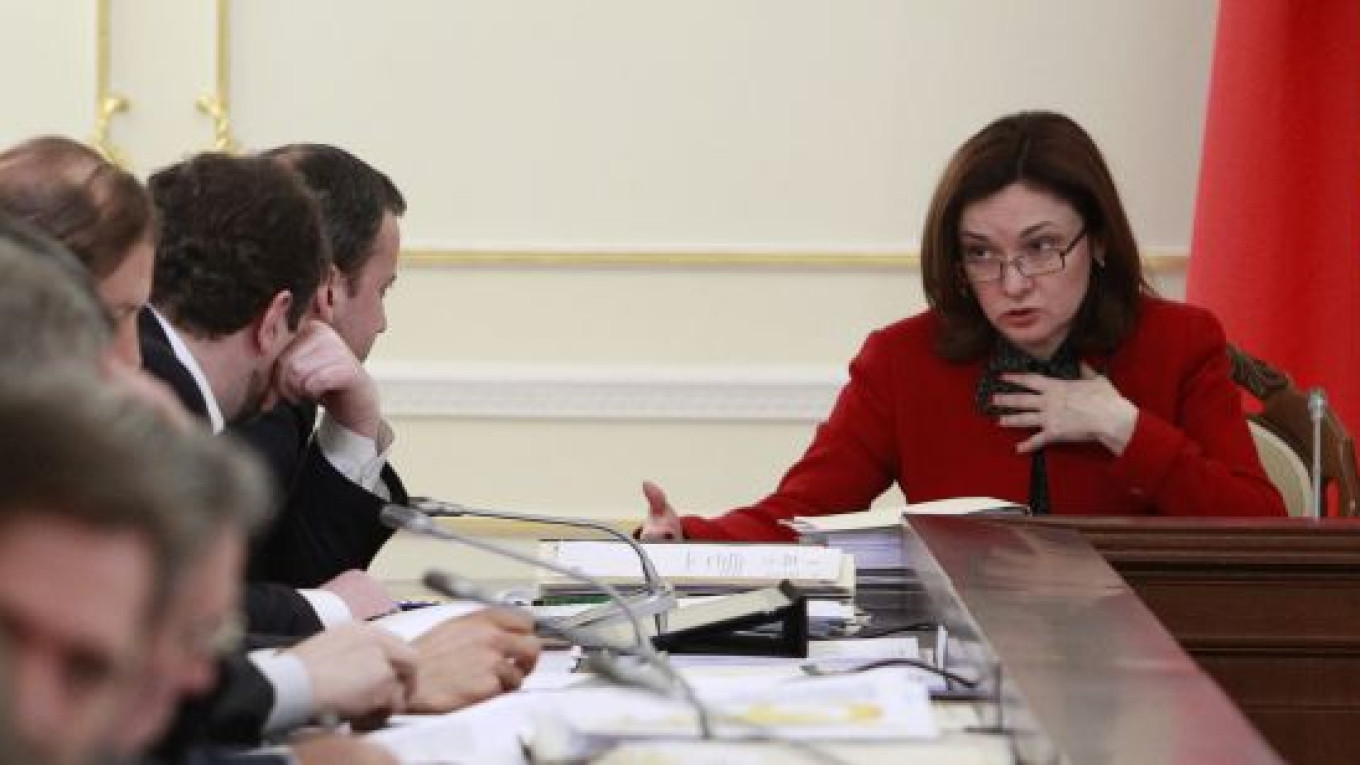The country’s next Central Bank chief? Elvira Nabiullina? said on Tuesday that she will aim to promote economic growth while gradually reducing inflation, signaling a dovish shift in monetary policy rather than a radical change.
She also pledged changes to boost the flow of credit to the real economy via lending to banks and rejected calls for a devaluation of the ruble to boost competitiveness following similar moves by major economies.
In an assured performance at a parliamentary confirmation hearing, the 49-year-old economist gave the fullest account of her views since she was hand-picked for the role by President Vladimir Putin last month.
Pro-Kremlin lawmakers comfortably carried a motion to back Nabiullina, who had emerged as a compromise choice trusted by Putin but acceptable to? Russia's broader economic policy establishment.
Nabiullina, Putin's top economic aide and a former economic development minister, backed her boss’s agenda for growth but stopped short of announcing a break with the? Central Bank’s traditionally hawkish view on inflation.
"As a former economic development minister, I can't help thinking about economic growth," Nabiullina told the? State Duma? on Tuesday. "The key task of the Central Bank will be to gradually reduce inflation … without choking off economic growth."
Her message of continuity and change during a speech and question-and-answer session drew positive reviews from the financial community in? Moscow.
"It was obvious that she was well prepared," said Ivan Tchakarov, an economist at Renaissance Capital. "She did her homework, which I think we should take positively."
Tchakarov said Nabiullina's comments had a "dovish flavor" but that he still expected her to lead "primarily an inflation-targeting Central Bank with the very important modifier that in future it will pay greater attention to growth".
Deputies later approved Nabiullina with 360 votes in favor, 20 against and one abstention. She will succeed? Sergei Ignatyev? on his retirement in June after 11 years in the job.
Since Putin's return for a third presidential term last year, aides have expressed dismay at the Central Bank's refusal to cut interest rates in response to weakening growth, although inflation exceeds its 5-6 percent target for 2013.
Nabiullina supported the regulator’s medium-term goal of reducing inflation to 3-4 percent from more than 7 percent now, saying that it was vital to promoting investment-led growth.
But she also left the door open to cuts in policy rates that are now negative in real terms. The Central Bank last week held its benchmark one-day auction repo rate at 5.5 percent.
"Even though current central bank rates are below inflation, there is still room for maneuver," Nabiullina said.
With economic growth slowing to an estimated 1 percent in the first quarter from 3.4 percent last year, rate cuts may not be long in coming, although some economists expect them only to begin after Ignatyev's departure.
Perhaps more important than rate cuts was a promise by Nabiullina to refine the Central Bank's toolkit for lending to banks, boosting flow of affordable credit to the real economy.
"This could have a greater impact on money markets than cutting policy rates," said? Alexei Pogorelov, an economist at Credit Suisse in? Moscow.
While Nabiullina ruled out a purge of the financial regulator, a bastion of the liberal policy establishment still informally led by ex-Finance Minister Alexei Kudrin, economists say personnel changes are likely.
"She is very focused on reviewing the balance between growth and low inflation as it is understood by the central bank," said? Yulia Tsepliaeva? at BNP Paribas in Moscow.
Nabiullina helped draft the market reforms that Putin implemented after he was first elected to the presidency in 2000 and served as economic development minister from 2007 to 2012.
True to her liberal background, she backed the Central Bank's commitment to a flexible exchange rate and repudiated calls from the Duma floor to join a round of competitive devaluations by the world's heavily-indebted advanced economies.
"A relatively flexible exchange rate, in my view, is more positive for the economy than an artificial weakening of the exchange rate," Nabiullina said, adding that it would act as a buffer against external economic shocks.
She also vowed to uphold the prudent management of the country’s gold and foreign exchange reserves of more than $500 billion, saying they should be diversified "to maximize stability and liquidity".
Asked whether the central bank should expend its reserves on supporting economic growth, Nabiullina said that was a task for the government, which had announced plans to plough some of its fiscal savings into infrastructure projects.
Related articles:
A Message from The Moscow Times:
Dear readers,
We are facing unprecedented challenges. Russia's Prosecutor General's Office has designated The Moscow Times as an "undesirable" organization, criminalizing our work and putting our staff at risk of prosecution. This follows our earlier unjust labeling as a "foreign agent."
These actions are direct attempts to silence independent journalism in Russia. The authorities claim our work "discredits the decisions of the Russian leadership." We see things differently: we strive to provide accurate, unbiased reporting on Russia.
We, the journalists of The Moscow Times, refuse to be silenced. But to continue our work, we need your help.
Your support, no matter how small, makes a world of difference. If you can, please support us monthly starting from just $2. It's quick to set up, and every contribution makes a significant impact.
By supporting The Moscow Times, you're defending open, independent journalism in the face of repression. Thank you for standing with us.
Remind me later.


